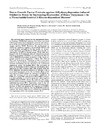Identificador persistente para citar o vincular este elemento:
https://accedacris.ulpgc.es/jspui/handle/10553/75448
| Título: | Nerve growth factor protects against 6-hydroxydopamine-induced oxidative stress by increasing expression of heme oxygenase-1 in a phosphatidylinositol 3-kinase-dependent manner | Autores/as: | Salinas, Marta Díaz, Raquel Abraham, Nader G. Ruíz de Galarreta, Carlos M. Cuadrado, Antonio |
Clasificación UNESCO: | 32 Ciencias médicas | Palabras clave: | Dismutase Gene-Expression Mediated Cell-Death Pc12 Cells Superoxide-Production Parkinsons-Disease, et al. |
Fecha de publicación: | 2003 | Publicación seriada: | Journal of Biological Chemistry | Resumen: | The survival signal elicited by the phosphatidylinositol 3-kinase (PI3K)/Akt1 pathway has been correlated with inactivation of pro-apoptotic proteins and attenuation of the general stress-induced increase in reactive oxygen species (ROS). However, the mechanisms by which this pathway regulates intracellular ROS levels remain largely unexplored. In this study, we demonstrate that nerve growth factor (NGF) prevents the accumulation of ROS in dopaminergic PC12 cells challenged with the Parkinson's disease-related neurotoxin 6-hydroxydopamine (6-OHDA) by a mechanism that involves PI3K/Akt-dependent induction of the stress response protein heme oxygenase-1 (HO-1). The effect of NGF was mimicked by induction of HO-1 expression with CoCl2,; by treatment with bilirubin, an end product of heme catabolism; and by infection with a retroviral expression vector for human HO-1. The relevance of HO-1 in NGF-induced ROS reduction was further demonstrated by the evidence that cells treated with the HO-1 inhibitor tin-protoporphyrin or infected with a retroviral expression vector for antisense HO-1 exhibited enhanced ROS release in response to 6-OHDA, despite the presence of the neurotrophin. Inhibition of PI3K prevented NGF induction of HO-1 mRNA and protein and partially reversed its protective effect against 6-OHDA-induced ROS release. By contrast, cells transfected with a membrane-targeted active version of Akt1 exhibited increased HO-1 expression, even in the absence of NGF, and displayed a greatly attenuated production of ROS and apoptosis in response to 6-OHDA. These observations indicate that the PI3K/Akt pathway controls the intracellular levels of ROS by regulating the expression of the antioxidant enzyme HO-1. | URI: | https://accedacris.ulpgc.es/handle/10553/75448 | ISSN: | 0021-9258 | DOI: | 10.1074/jbc.M209164200 | Fuente: | Journal of Biological Chemistry [ISSN 0021-9258], v. 278 (16), p. 13898-13904, (Abril 2003) |
| Colección: | Artículos |
Citas SCOPUSTM
237
actualizado el 08-jun-2025
Citas de WEB OF SCIENCETM
Citations
229
actualizado el 22-feb-2026
Visitas
53
actualizado el 09-dic-2023
Descargas
70
actualizado el 09-dic-2023
Google ScholarTM
Verifica
Altmetric
Comparte
Exporta metadatos
Los elementos en ULPGC accedaCRIS están protegidos por derechos de autor con todos los derechos reservados, a menos que se indique lo contrario.
